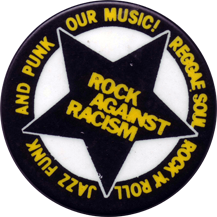
Rocking against Racism, Then and now
01.09.2017
Shirsho Dasgupta interviews Mark Perryman Co-founder of Philosophy Football about the meaning and sgnificance of Rock against Racism
Shirsho Dasgupta As someone who lived through the era, how would you describe the socio-political and economic situation of the United Kingdom in the 1970s and early 1980s?
Mark Perryman The late 1970s have to be remembered as an era of intense conflict. Huge industrial disputes, the miners strikes and Grunwick, the public sector strikes of winter of ’78. Even the bread bakeries went on strike! The war in Northern Ireland, the rise of the fascist National Front and their increasingly violent marches. At the same time this was the dawn of Thatcherism and the eclipse of postwar social democracy.
SD What was the appeal of punk and reggae at the time? Was it the lyrics, the stripped-down raw sound, or a combination of both?
MP This was the era of Pink Floyd, Genesis, Yes, ELO. They seemed increasingly divorced from the lived experience of teenage Britain. The Rolling Stones were living off a heyday a decade old, nearly 40 years later they still are. The teeny bop bands were taking over the charts, the Bay City Rollers. The Sex Pistols Bill Grundy live TV interview, which I can still remember absolutely vividly quite literally said ‘up yours’ to all this. And pretty soon there emerged some sort of commonality with reggae too. That wasn’t universal but there was at least an awareness that different youth culture communities were finding their own voice in place of the one pop culture manufactured for them.
SD Besides the music, what were the other aspects of Rock against Racism that were significant?
MP I’d answer that in two ways. First, there was no certainty that the nihilism of punk, complete with Nazi-swastika imagery, would turn in a progressive, anti-racist direction. The fact that it did was both hugely significant and  down to Rock against Racism (RAR). Second, RAR was a movement anyone could join because there was nothing to join. No membership card, no delegates to be elected, no conferences to attend, no votes to be had. Just a roll of dayglo stickers, a badge, and a do-it-yourself gig culture, that was what made you a member, a part of it. This was a politics from below, it was fun, anybody could do it however, whenever, wherever. And this was all pre-social media. A phenomenal achievement that has never really been matched since. The closest has been this years ‘ Oh Jeremy Corbyn ‘ chant, a sense of being part of something much bigger than ourselves alone but yet to take a popular culture form. If and when it does the potential for a shift to the left will be huge. The writer Tom Blackburn calls this potential ‘Corbynism from Below’ I like the sound of that.
down to Rock against Racism (RAR). Second, RAR was a movement anyone could join because there was nothing to join. No membership card, no delegates to be elected, no conferences to attend, no votes to be had. Just a roll of dayglo stickers, a badge, and a do-it-yourself gig culture, that was what made you a member, a part of it. This was a politics from below, it was fun, anybody could do it however, whenever, wherever. And this was all pre-social media. A phenomenal achievement that has never really been matched since. The closest has been this years ‘ Oh Jeremy Corbyn ‘ chant, a sense of being part of something much bigger than ourselves alone but yet to take a popular culture form. If and when it does the potential for a shift to the left will be huge. The writer Tom Blackburn calls this potential ‘Corbynism from Below’ I like the sound of that.
SD Do you think in the age of rising Islamophobia, homophobia, and Trump, we can describe our situation today as similar to that four decades ago?
MP Not exactly. But what we are beginning to witness, this is where the parallels lie, is the break up of another period of consensus, neoliberalism. In Britain this is sparking a shift to the Left led by Jeremy Corbyn but that break is much less obvious elsewhere, for example Trump in the US, Macron in France.
SD Do you think today a cultural movement like RAR can be as potent a fighting force against the right-wing as it was forty years ago?
It can be potent but it won’t be the same. It’s not really for me and those of my generation to speculate on what it would look, or sound, like, that’s for the new and next generation Left to shape. But I do think it is entirely valid to assert the necessity of such a clash, what Stuart Hall described in 1978 as ‘ one of the timeliest and best constructed of cultural interventions’ to consder the reasns too for the near total absence of anything of RAR’s scale of ambition, imagination and reach since the 1980s aftermath of miners solidarity gigs and of course Red Wedge, and the conditions that might spark something of this sort again. That’s what I see in Corbynism, and perhaps #grme4corbyn too, certainly the ‘Ohhhh Jeremy Corbyn Chant’ . Not rooted in the individual, however appealing Jeemy Corbyn might be, nor the Labour Party, however big it has becime in terms of membership, but this much more generalized mood that at last change is becoming possible. If a popular cultural movement emerges then this shift will be immeasurably strengthened and right now we have the makings of this as a possibility. It’s a window of opportunity, for the first time since ’78 and RAR’s Carnival helped to ensure the defeat of the NF.
Mark Perryman is a contributor to Reminscences of RAR : Rocking against Racism 1976-1982. His own bookThe Corbyn Effect is out in mid-September available to pre-order here.